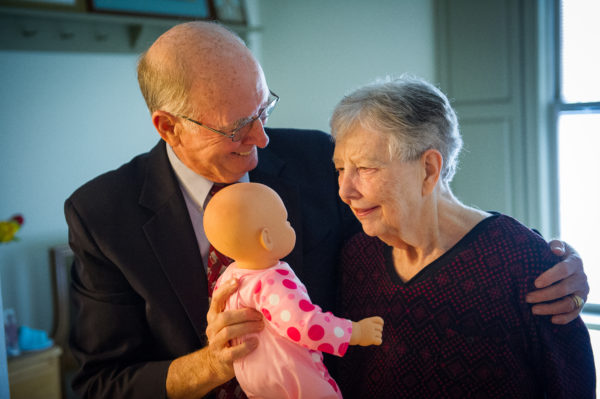Free Resource Helps Congregations Care For People With Dementia Diseases And Their Families
For Bishop Kenneth Carder, retired bishop of The United Methodist Church, November 2, 2009, is a date he will never forgot. The irony is that his wife, Linda, has.
On that brisk November day, the Carders received Linda’s diagnosis of Frontotemporal Dementia. Since then, Bishop Carder has watched Linda slowly lose the ability to do everyday tasks such as cooking, bathing, and dressing. She also no longer speaks coherently or remembers day-to-day events or the people who love her most…her husband and two daughters.

Bishop Carder’s experience with loving, living, and caring for someone who has Alzheimer’s or another form of dementia is hardly unique. That November day when Linda was diagnosed, approximately 1,100 other individuals and their families in the US received a similar diagnosis. That was one person every 77 seconds.
And the number is escalating. Today, someone is diagnosed with Alzheimer’s or another form of dementia every 66 seconds. By 2050, it will be one person every 33 seconds.
In response to this growing epidemic and based on his own family’s experience, Bishop Carder created Alzheimer’s/Dementia: Ministry with the Forgotten. This free five-part study is designed to start conversations and generate action around caring for people who have a form of dementia as well as their families and caregivers.
“Linda’s changes were subtle to me at first,” said Bishop Carder. “She had difficulty choosing an item on a restaurant menu and handling the checkbook. But our daughters quickly picked up on her difficulties during one of our visits with them. They knew something was wrong with their mother.”
Upon returning home, the Carders set up an appointment at Duke Medical Center. “Linda’s diagnosis suddenly explained some of her behaviors that had been frustrating me,” said Bishop Carder. “I’d think ‘Can’t you just concentrate?’ or ‘Why aren’t you listening to me?’ It wasn’t Linda, it was the disease.”
Since the diagnosis, Bishop Carder has served in a new vocation—that of caregiver for Linda. Together with their two daughters and home health care workers, Linda receives round-the-clock love and care.
Dementia’s Staggering Statistics
The financial and physical toll on families and caregivers is tremendous. Currently more than 15 million Americans provide unpaid care for people with Alzheimer’s or other dementia. In 2016, caregivers provided an estimated 18.2 billion hours of care valued at over $230 billion. In 2017, Alzheimer’s and other dementias cost the nation $259 billion. By 2050 those costs could rise as high as $1.1 trillion.
One in three seniors dies with Alzheimer’s or another dementia. It’s the 6th leading cause of death, killing more people than breast and prostate cancers combined. Currently there is no cure.
The Church’s Responsibility
While the statistics are staggering and the prognosis is poor, Bishop Carder charges that there is hope in the form of the church’s response to this disease. “The church has the unique opportunity, even responsibility, to minister to the needs of people who are suffering from neurological cognitive disorders as well as the families and medical professionals who care for them.
“In a culture that idolizes an identity based on what we do, how we think, and how we look, people with dementia diseases are stigmatized and diminished. I used to say ‘I’d rather lose my life than my memory.’ But I was wrong. I don’t say that anymore because I don’t believe that anymore. I am not my memory. I am more than my memory, I am whatever and whoever God says I am.”
Out of his experience as Linda’s caregiver and as volunteer chaplain at Bethany Memory Care Unit at the Heritage at Lowman in Chapin, South Carolina, Bishop Carder came to realize that The United Methodist Church is in a unique position to be in mission and ministry with people who have Alzheimer’s and other dementias as well as their families and caregivers.
“It’s a double-edge sword,” Bishop Carder said. “People with dementia lose their way of participating in the church while our religion is so thinking-oriented, we eliminate the people who no longer think in the way we do.
“This growing epidemic provides an opportunity for the church to evaluate its theology; it’s a way of understanding and experiencing God. Linda is pushing my theology beyond the comfort zone and expanding my vision of the church’s nature and mission.”
This issue is significant for United Methodists. In 2015, the median age of the US population was 37.6. For United Methodists, it was 57. “As a church, we are almost 20 years older than the general population. That means we could have a disproportionate number of United Methodists receiving a diagnosis of Alzheimer’s and other dementias sooner than the general society.
“Many of these United Methodists have adult children who caring for their own young children. If the church can help these young adults deal with caregiving issues related to their aging parents, we will in essence be saying ‘Yes, you belong here because we love your parents too.’”
The Church’s Response
Designed for small-group use, Bishop Carder’s Alzheimer’s/Dementia: Ministry with the Forgotten, features five one-hour sessions exploring topics such as:
- The impact and challenges of Alzheimer’s and other forms of dementia
- The theological basis for church involvement
- Practical and specific ways local congregations can be involved in caring for those with dementia and their caregivers
- Ways we can communicate, interact, and even worship with people who have Alzheimer’s and dementia
“I spent my ministry teaching United Methodist beliefs, theology, and creeds to others,” said Bishop Carder. “But what about people with dementia? Linda no longer has any knowledge of creeds. She’s forgotten who Jesus is. Can she be a disciple? What about those who can no longer believe intellectually or speak? This resource will help congregation members transform their churches into dementia-friendly churches.”
